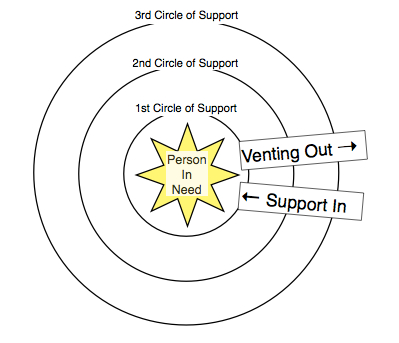When someone goes through trauma or a high-needs situation — momentary, chronic, or terminal — not only is it hard on the person going through it, but it puts a strain on everyone trying to support and give care.
So much so that caregiver burnout is literally a cliche in some circles.
I first heard about “the ring theory of kvetching” from Jay Darling — who joined the Cascadia Workshops team earlier this year — who got it in an email from his mom, Ann Darling. Below is my brief paraphrase followed by a link to the original article.
The person or people with the illness, trauma, or super hard situation — they get to complain outwardly to their first circle of support.
The first circle of support does NOT vent — about the challenges, the loss of sleep, the emotional toll, etc. — to the person or people at the center of the trauma.
But they DO get to vent outwardly.
Again, the first circle of support is spared from the venting of the second circle, who, again, only vents outwardly.
Support, caring, comfort FLOWS IN.
Kvetching, venting, complaining, requests for empathy, all of this only FLOWS OUT.
Here’s a little graphic I created to illustrate this, and below that, the original email I received.

My closest community is going through this in more than one situation, and this concept has been very helpful as a reminder of how I want to show up with whom.
(Thank you to Susan Silk and Barry Goldman, who wrote this up as an Op-Ed in the Los Angeles Times).
As the person in need, my experience has been that the kvetching, complaining, requests for empathy etc… can only last so long before the circles of support think enough is enough, time for you to get back to your normal self and get out of the center and comfort yourself… my partner was on the verge of burnout. I think this theory would have been very helpful… allowing my partner to vent out onto another circle of support, rather than dumping it on me. What happens when both partners are in a difficult situation at the same time?
Thank you for your question… This actually comes up a lot.
A conversation can easily get stuck if both people are in great need of empathy. They both need it, and therefore it is hard to give it to the other person. What gets in the way of me being fully present with you is that I have too much going on.
This is why we need more than one person for support.
Even for people who are “mostly ok most of the time” I recommend pulling together a circle of support comprised of a minimum of 3 people (3 to 10 is what I recommend).
So each of the rings would ideally have 3 to 10 people.
In this kind of situation, of both people are experiencing the conversation as stuck, they have more people to reach out to for healthy venting.
In cases in which there is a lack of friends, family and community that can populate these concentric circles of support, people will often turn to a counselor or therapist to meet that need.
I’m wondering if this is helpful.
Thank you for engaging.
How do I introduce the circle of kvetching to a freind of a freind who is dealing with cancer? This friend has their own issues and could use their own support network but complains inappropriately to my friend with cancer.
Hi Walter:
Have you considered something like:
I found an article I thought you’d enjoy and found useful…
…and then share the URL.(?)